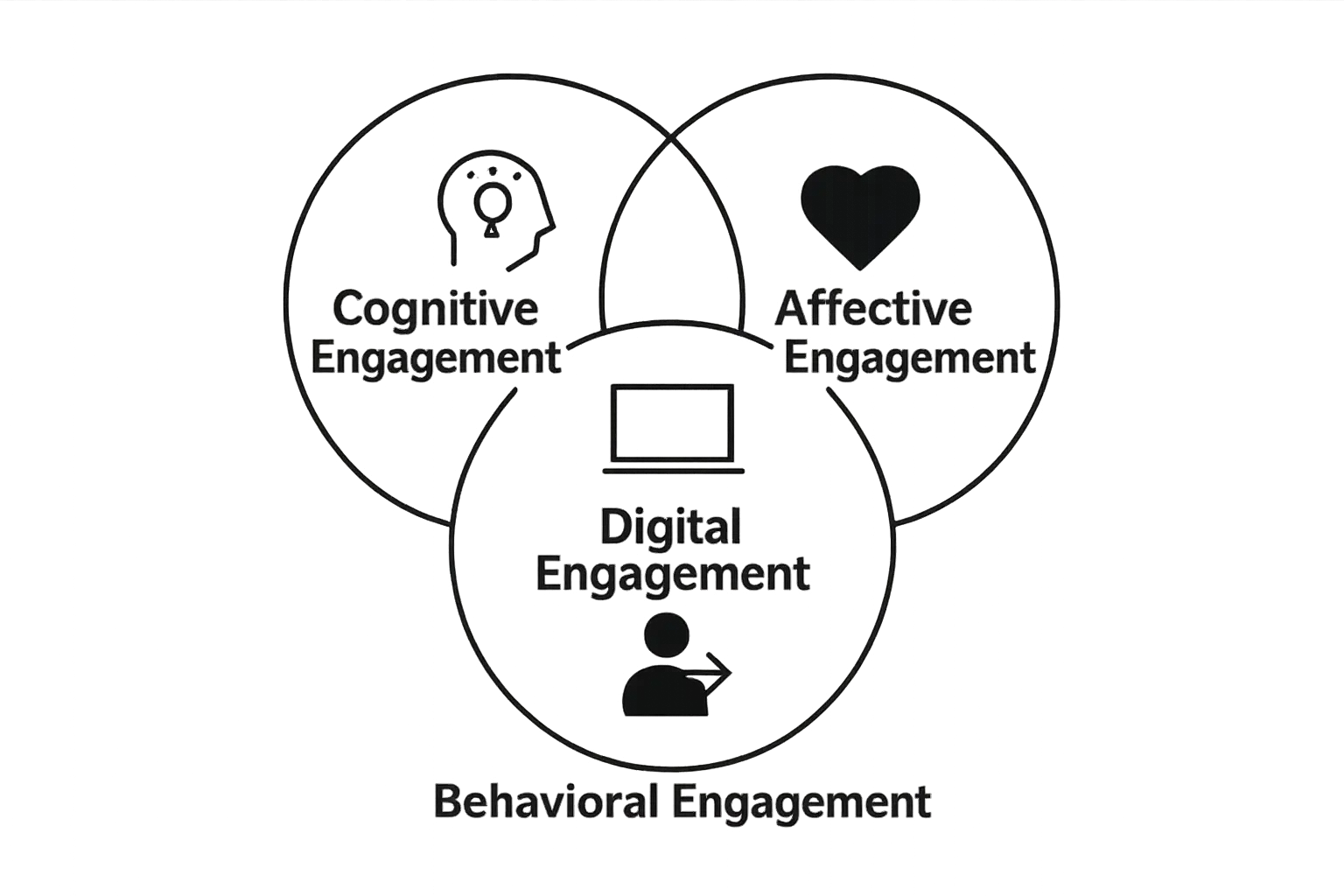What is Digital Engagement? Understanding Its Impact

Everyone talks about connecting online, but digital engagement goes way beyond the usual likes and comments. Surprisingly, it is not only about getting people to click and scroll. The real difference is in how people think, feel, and act online at the same time, with studies showing digital engagement is actually a complex mix of cognitive, emotional, and behavioural investment. So while most strategies chase quick clicks, the secrets lie deeper in building genuine digital relationships that last.
Table of Contents
- Defining Digital Engagement: Concepts And Characteristics
- The Significance Of Digital Engagement In Modern Organisations
- How Digital Engagement Functions: Tools And Strategies
- Key Elements Of Successful Digital Engagement Initiatives
Quick Summary
| Takeaway | Explanation |
|---|---|
| Digital engagement enhances human connections | It goes beyond transaction by fostering meaningful interactions among users through digital platforms. |
| Incorporate user feedback in strategies | Effective digital engagement requires continuous adaptation based on user insights and analytics to meet member needs. |
| Focus on personalised experiences | Personalisation creates more meaningful interactions and enhances member satisfaction and loyalty within organisations. |
| Develop a robust communication infrastructure | A strong technological foundation is essential for facilitating seamless, multidirectional communication in digital engagement. |
| Leadership commitment drives effectiveness | Successful digital engagement initiatives need strong leadership support to ensure alignment with organisational vision and objectives. |
Defining Digital Engagement: Concepts and Characteristics
Digital engagement represents a comprehensive approach to interaction and involvement through digital platforms and technologies. At its core, digital engagement encompasses the ways individuals, organizations, and communities connect, communicate, and collaborate using digital channels.
The Multidimensional Nature of Digital Engagement
According to research from MDPI, digital engagement is a complex psychological investment involving multiple dimensions:
- Cognitive Engagement: The intellectual effort and mental commitment users invest in digital interactions
- Affective Engagement: Emotional connections and feelings generated through digital experiences
- Behavioral Engagement: Active participation and specific actions taken within digital environments
These dimensions work synergistically to create meaningful digital interactions that go beyond simple transactional exchanges. Whether in educational settings, professional environments, or community platforms, digital engagement aims to foster deeper connections and more impactful experiences.
Below is a table outlining the three key dimensions of digital engagement, summarising their definitions and real-world implications to provide greater clarity on how each dimension contributes to overall engagement.
| Dimension | Definition | Real-World Implication |
|---|---|---|
| Cognitive Engagement | The intellectual effort and mental commitment users invest in digital interactions | Enhances user focus and understanding within digital spaces |
| Affective Engagement | Emotional connections and feelings generated through digital experiences | Fosters loyalty and positive sentiment towards platforms |
| Behavioural Engagement | Active participation and specific actions taken within digital environments | Increases contribution, activity, and interaction online |

Key Characteristics of Effective Digital Engagement
Effective digital engagement strategies share several fundamental characteristics. They are interactive, personalized, and designed to create genuine value for participants. These strategies typically involve:
- Creating intuitive and responsive digital interfaces
- Providing meaningful content and interactive experiences
- Enabling two-way communication channels
- Measuring and adapting based on user feedback and analytics
To enhance your understanding of member interaction strategies, learn more about our digital communication approaches.
Ultimately, digital engagement is not just about technology but about creating human-centric experiences that connect, inform, and inspire across digital platforms.
The Significance of Digital Engagement in Modern Organisations
Digital engagement has transformed from a strategic option to a critical operational necessity for modern organisations. In an increasingly interconnected world, organisations must leverage digital platforms to remain competitive, responsive, and relevant.
Driving Organisational Performance and Transformation
Research from Frontiers in Psychology highlights that fostering a digital organizational culture is essential for enhancing strategic performance. The significance of digital engagement extends far beyond mere technological adoption, encompassing fundamental shifts in how organisations interact, communicate, and deliver value.
Key performance impacts include:
- Enhanced communication and collaboration across teams
- Improved customer and member experience
- More agile and responsive organisational structures
- Greater capacity for data-driven decision making
Strategic Implications of Digital Engagement
Modern organisations increasingly recognize digital engagement as a core strategic capability. The COVID-19 pandemic accelerated this transformation, demonstrating that digital platforms are not supplementary but fundamental to organisational resilience.
Digital engagement enables organisations to:
- Adapt quickly to changing market conditions
- Create more personalized member experiences
- Develop more inclusive and flexible communication channels
- Reduce operational costs through streamlined digital processes
Explore strategies for improving member interactions to understand how digital engagement can revolutionize your organisational approach.
Ultimately, digital engagement represents more than a technological trend. It is a strategic imperative that determines an organisation’s ability to thrive in an increasingly digital, interconnected global environment.
How Digital Engagement Functions: Tools and Strategies
Digital engagement operates through a sophisticated ecosystem of technological platforms, communication channels, and strategic approaches designed to create meaningful interactions between organisations and their members.
Core Digital Engagement Mechanisms
Research examining digital community engagement approaches reveals that effective digital engagement relies on multifaceted technological infrastructure. These mechanisms transform traditional interaction models by enabling real-time, personalised, and scalable communication strategies.
Key technological foundations include:
- Interactive digital platforms
- Data analytics and tracking systems
- Personalisation algorithms
- Multichannel communication tools
- User experience design interfaces
Strategic Implementation Frameworks
Successful digital engagement demands more than technological capability. It requires a holistic approach that integrates technological tools with nuanced understanding of member preferences, behavioural patterns, and organisational objectives.
Effective digital engagement strategies typically involve:
- Continuous user experience mapping
- Adaptive communication protocols
- Responsive feedback mechanisms
- Data-driven personalisation techniques
Discover advanced communication strategies for member organisations to understand how sophisticated digital tools can transform organisational interactions.
Ultimately, digital engagement functions as a dynamic, intelligent system that bridges technological capability with human-centric communication approaches, enabling organisations to create more meaningful, responsive, and personalised interactions.
Key Elements of Successful Digital Engagement Initiatives
Building effective digital engagement requires a strategic, holistic approach that goes beyond mere technological implementation. Successful initiatives demand careful planning, comprehensive understanding, and continuous adaptation.
Foundational Strategic Components
Digital Promise research highlights the critical elements that drive successful digital engagement across various organisational contexts. These foundational components create a robust framework for meaningful digital interactions.
The following table presents the foundational strategic components essential for successful digital engagement initiatives, helping organisations ensure their strategies are built on robust and comprehensive elements.
| Strategic Component | Description |
|---|---|
| Organisational Vision and Objectives | Clear purpose and measurable goals guiding all digital engagement efforts |
| Technological Infrastructure | Reliable and scalable platforms, systems, and tools underpinning interactions |
| Data Collection and Analysis | Methods for gathering, analysing, and applying data to inform decisions |
| Adaptive Communication Protocols | Flexible frameworks enabling responsive, two-way communication |
| Leadership Commitment | Continuous support and direction from senior management for digital success |
Key strategic foundations include:
- Clear organisational vision and objectives
- Comprehensive technological infrastructure
- Robust data collection and analysis capabilities
- Adaptive communication protocols
- Strong leadership commitment
User-Centric Design and Implementation
Successful digital engagement initiatives prioritize user experience and interaction quality. This approach requires deep understanding of member needs, preferences, and behavioural patterns. Organisations must design digital platforms that are intuitive, accessible, and genuinely valuable to their members.
Critical implementation considerations encompass:
- Personalisation of digital experiences
- Seamless multichannel interaction
- Responsive and accessible design
- Continuous user feedback mechanisms
- Privacy and security considerations
Explore proven strategies for improving member interactions to understand how sophisticated approaches can transform organisational digital engagement.
Ultimately, successful digital engagement is not about technology alone, but about creating meaningful, human-centred digital experiences that genuinely connect, inform, and empower members.

Transform Digital Engagement Into Real Growth for Your Membership Organisation
Are you struggling to create meaningful digital connections that spark true member engagement? As outlined in this article, modern organisations face the critical challenge of moving beyond transactional exchanges to build deeper cognitive, affective and behavioural engagement online. The right digital tools and strategies are now fundamental for fostering loyalty, improving retention and keeping pace with evolving member expectations. Yet, many organisations lack a unified approach that brings seamless communication, data-driven personalisation and intuitive member experiences together under one roof. That gap in your digital engagement strategy is holding back growth and impact.

At Colossus Systems, you can overcome these pain points by unifying member management, events, communication and analytics on a single platform designed for engagement from the ground up. If you want to see how your organisation can personalise outreach, simplify event planning and deliver value at every digital touchpoint, get in touch here. Act now and discover how our all-in-one digital solution empowers your team to strengthen connections, streamline operations and scale your member base faster. Take your next step towards strategic digital engagement success with Colossus Systems today.
Frequently Asked Questions
What is digital engagement?
Digital engagement refers to the ways individuals, organisations, and communities interact and communicate through digital platforms and technologies. It focuses on creating meaningful connections and experiences rather than just transactional exchanges.
Why is digital engagement important for organisations?
Digital engagement is crucial for organisations as it enhances communication, improves customer experience, and fosters agility in operations. In today’s interconnected world, leveraging digital platforms is essential for remaining competitive and responsive to market changes.
What are the key dimensions of digital engagement?
The key dimensions of digital engagement include cognitive engagement (intellectual involvement), affective engagement (emotional connections), and behavioural engagement (active participation). These dimensions work together to create impactful digital interactions.
How can organisations implement effective digital engagement strategies?
Effective digital engagement strategies involve creating user-friendly digital interfaces, providing relevant content, facilitating two-way communication, and continuously measuring feedback and performance. Integrating technology with a deep understanding of user preferences is essential for success.